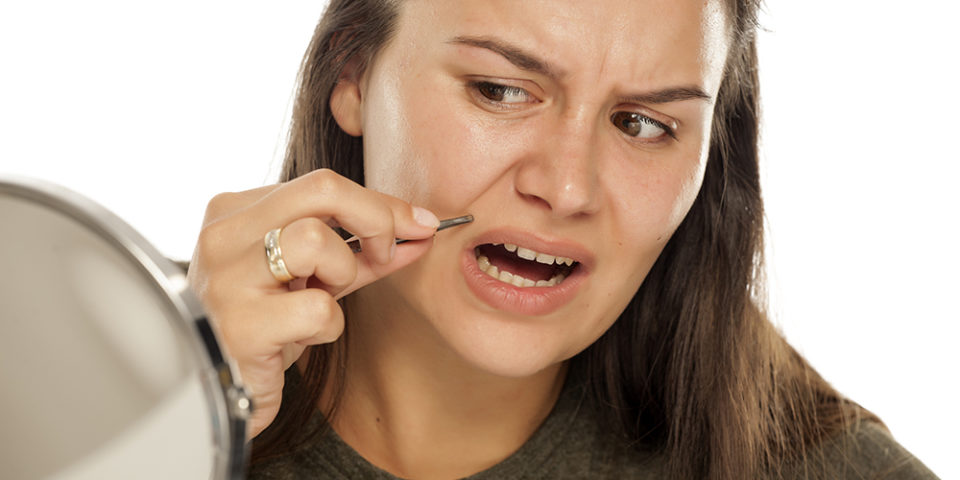

For those who have caught themselves looking in dismay at a stubborn chin hair that keeps popping up, it can seem like facial hair growth in women is inevitable, especially after the age of 30. What causes facial hair growth in women? Kelly Ann McClure, DO, explained why facial hair commonly appears and what you can do to slow or even stop those stubborn chin, jaw, or upper lip hairs from appearing.
Is growing facial hair normal for women in their 30s and 40s?
“Common? Yes. But I wouldn’t call it normal,” said Dr. McClure. “Women do have some normal facial hair growth, but it should be wispy, pale, and not particularly noticeable. The growth of coarse, dark hairs, though, suggests a potential imbalance of hormones and circulating androgens.”
Androgens are the hormones most associated with men, with testosterone being the most widely known. These hormones encourage coarse, darker hair growth in the primarily ‘male’ locations of the face, chest, neck and back.
Age, ethnicity and other factors can influence the rate of growth and the appearance of the hair itself, but they’re not the cause of facial hair growth in women.
Are there medical conditions that can cause facial hair growth in women?
“There are definitely a few medical conditions where facial hair growth is either a side effect or a direct effect of the condition,” said Dr. McClure.
Medical reasons for facial hair growth in women include:
- Polycystic ovary syndrome
- Androgen-secreting tumors
- Nonclassic congenital adrenal hyperplasia (CAH)
- Cushing syndrome
- Hyperthecosis
Alongside these direct causes of facial hair growth, things like sudden weight gain or loss, obesity, increased insulin resistance or diabetes may also cause unwanted hair growth more indirectly.
Is there any way to treat unwanted facial hair growth in women?
“We find that the most effective way to treat the growth of unsightly, unwanted facial hair is to treat whatever underlying condition is causing it,” said Dr. McClure. “If the issue is being caused by an overabundance of androgens in the system, we want to figure out why that imbalance has happened and correct it.”
In the case of an androgen-secreting tumor, surgical removal of the tumor may help to restore the hormonal balance in the body. Polycystic ovary syndrome has its own series of treatments, including weight loss. Many of those with PCOS find that facial hair growth slows as soon as the condition is controlled.
Oral contraceptive pills to help with hormonal imbalances, spironolactone and topical eflornithine are all medications that might also be prescribed in the case of unwanted facial hair.
How would the conditions that cause unwanted facial hair growth in women be diagnosed?
“For the most part, these conditions will be observed and diagnosed through your usual physical exams with your doctor,” said Dr. McClure. “And if your physician decides to test for an underlying cause, that’s when you might undergo bloodwork or a pelvic ultrasound as a diagnostic tool.”
Is there any way to permanently remove unwanted facial hair?
If the underlying issue is successfully treated, hair growth should lessen and eventually may stop altogether.
If you continue to deal with unwanted facial hair or unsightly body hair elsewhere, there are some less permanent, but still effective treatment options. Laser hair removal or medications may be used, and doctors have generally found that utilizing more than one of these approaches at a time is more effective than just choosing one.
Choose a caring, trusted OB/GYN
Find a provider who’s right for you by viewing their online profiles, star ratings and reviews.
Find an OB/GYN





































